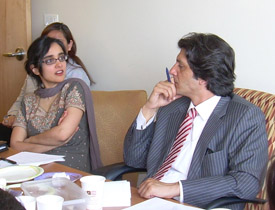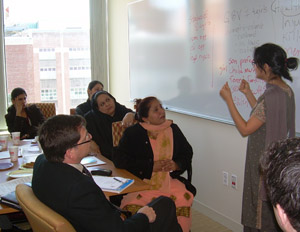Pakistani Delegation Visits BUSPH to Discuss Gender-Based Violence
Despite the media hype around a proposed new law in Pakistan that would ban domestic violence, a delegation of Pakistani legal experts and women’s rights activists who came to the Boston University School of Public Health April 14 to meet with Associate Professor Anita Raj said women remain undervalued and underserved in their country.

“The government has very few progressive programs” to address gender-based violence, reproductive health and adolescent marriage, said Rabbiya Iftikhar Bajwa, a lawyer and women’s rights activist who was among the delegation. “These issues are very serious, and we have much work to do to address them.”
Bajwa was among a seven-member Pakistani delegation spending three weeks in the U.S. on a diplomatic visit sponsored by the U.S. State Department to discuss combating gender-based violence. After visits to Washington, DC, and other cities, the group spent a morning discussing women’s health issues with Raj, associate professor of community health sciences, who has conducted research into reproductive health, child marriage and gender-based violence in South Asia.
Raj said she and fellow researchers hope to collaborate with members of the delegation on future research projects. The Pakistani group included representatives of several non-profit organizations in Pakistan that work to empower women and combat discrimination.
The visit was part of the State Department’s International Visitor Leadership Program, designed to build mutual understanding between the U.S. and other countries on issues of concern. Raj was among the experts asked to meet with the group to exchange views on how to prevent and prosecute gender-based violence.
Raj said gender-based discrimination has tragic consequences for women in South Asia and other parts of the world, including child marriage, forced fertility, infant and maternal mortality and sex trafficking. “Our research seeks to draw the distinctions within gender-based violence and identify some of the cultural factors,” said Raj, whose research has focused on India and Afghanistan.
Members of the Pakistani delegation said they believe that expanding educational and economic opportunities are keys to improving women’s standing in Pakistan, and they cited a need for more family-planning programs and education about contraceptive spacing of births.

Women in rural areas need the most help, said Sabiha Shah, chairwoman of the Women Development Foundation of the Khawateen Committee Lyari Community Development Project.
“In urban areas, where women are more educated, they are making decisions” about marriage, motherhood and careers, Shah said. “It is not the same” in rural areas.
Rights advocates who are pushing the proposed law banning domestic violence are hoping it will bring Pakistan into line with a growing number of developing nations that have outlawed spousal abuse. But the law has been opposed by some Islamist lawmakers in Parliament, who claim it would undermine the family structure.
Violence against women is a widespread phenomenon in Pakistan, a Muslim-majority nation where most people are poor, only half of adults can read, and clerics exercise significant power. In 2008, there were at least 7,571 incidents of acid attacks, rapes, spousal beatings and other violence against women, according to The Aurat Foundation, a women’s rights group. A 2009 State Department Human Rights Report found young Pakistani girls and women were especially vulnerable to problems related to sexual and reproductive health and rights. According to the National Committee for Maternal and Neonatal Health, only 30 percent of married women of reproductive age used any contraceptive method.
The status of women is a paradox in a country once headed by a woman prime minister, Benazir Bhutto, who was assassinated in 2007.
Raj told the delegation that legislation alone would not solve problems such as child marriage and gender-based violence, and she encouraged the group to develop programs that would educate both young women and men about family-planning and women’s reproductive health. She noted that while India has a higher legal age of marriage than Pakistan — 18, versus 16 in Pakistan — child marriage rates actually are higher in India, especially in rural areas.
“It is not enough to just have the laws. They don’t reach down into the communities,” Raj said.
Delegation members agreed, with Shah saying that her country is doing more education, via advertising, on contraceptive use and women’s health. She said more health education programs are needed in schools.
The group also talked about the need to train police officers to respond to cases of domestic violence with greater sensitivity. At Raj’s invitation, Meena Sonea Hewett, director of a Massachusetts-based organization called Saheli that provides support for South Asian women and families, spoke to the delegation about the success of a police training program that her agency conducted.
The Pakistani visitors said they looked forward to the day when police in their own country would be specially trained to deal with domestic violence.
“Mostly you work on these problems in your own home, in your own family,” said Omar Khayyam, project manager of the Female Human Rights Organization (FEHRO).
Other members of the delegation included Muhammed Nasir Habib, director of the Women’s Socioeconomic Development Project of Community Support Concern; Tahira Khursheed, chairwoman of the Sahil Health and Development Organization for Women (SHADOW); Zubeda Yousef, assistant manager of the Gender and Environment Program of the Shirkat Gah Women Resource Center; and Sadia Chaudhary, a female prosecutor who works on crimes against women. The visit was overseen by the organization WorldBoston.
Raj said the delegation’s focus on gender-based violence was a positive sign that Pakistan is coming to terms with the problem.
“It’s just extraordinary to me that a delegation from Pakistan is here, focusing on these issues,” she said. “That gives me optimism. I’m honored to be a part of it.”
Submitted by Lisa Chedekel